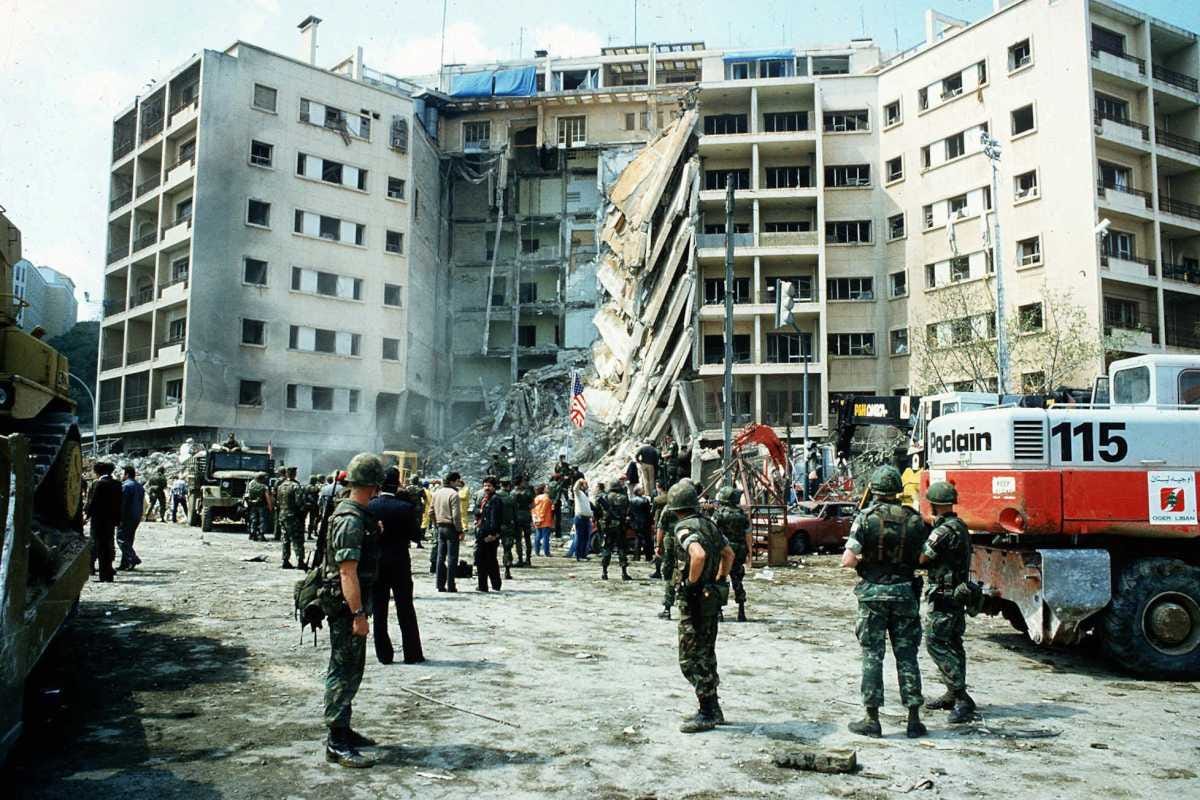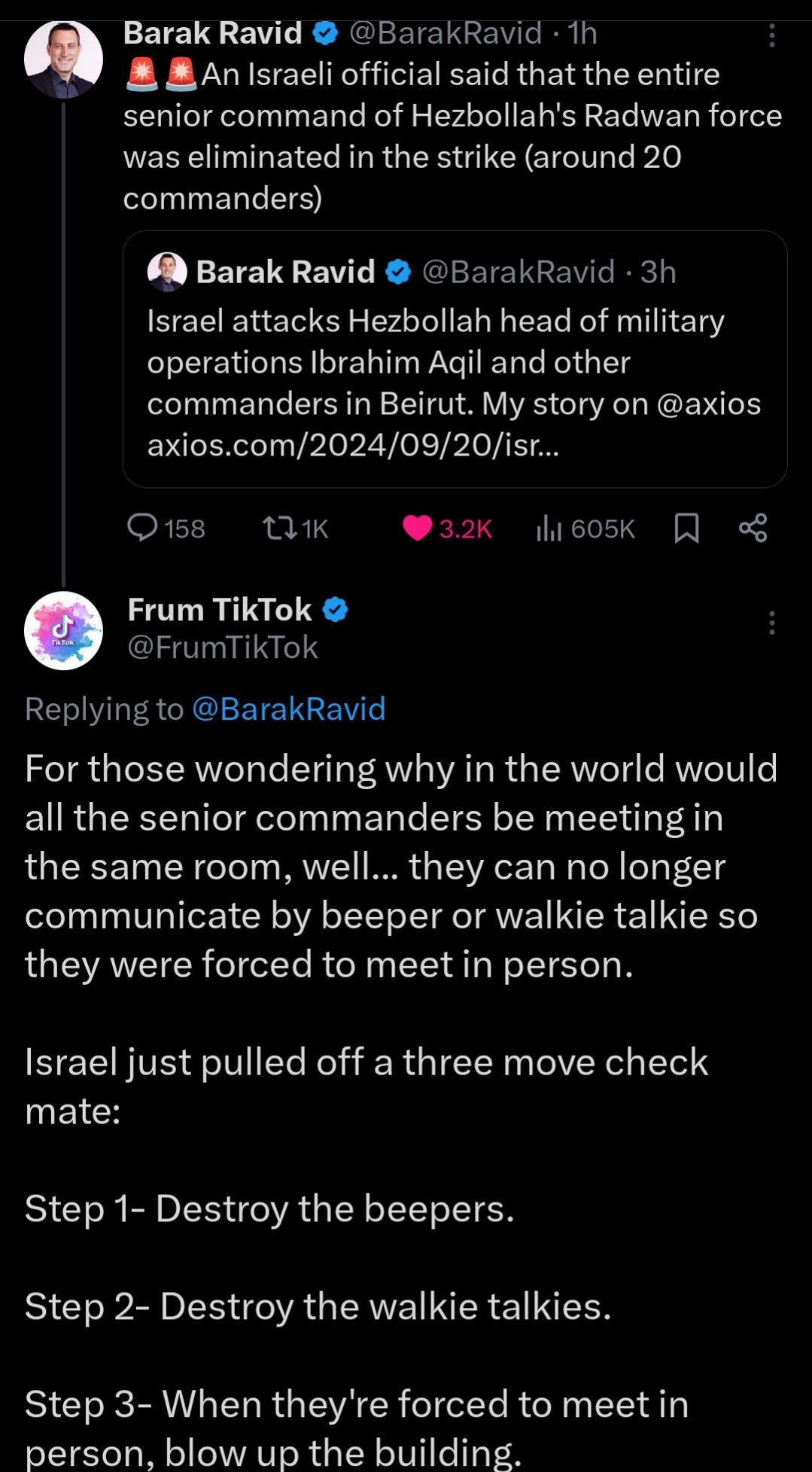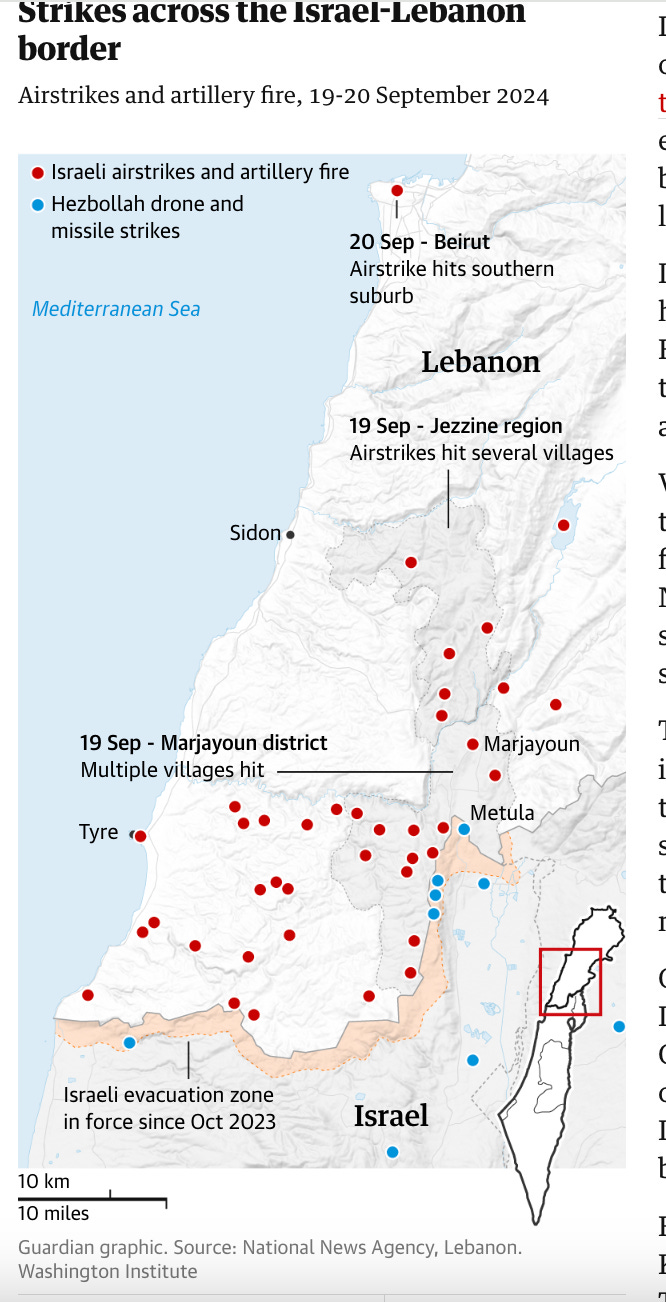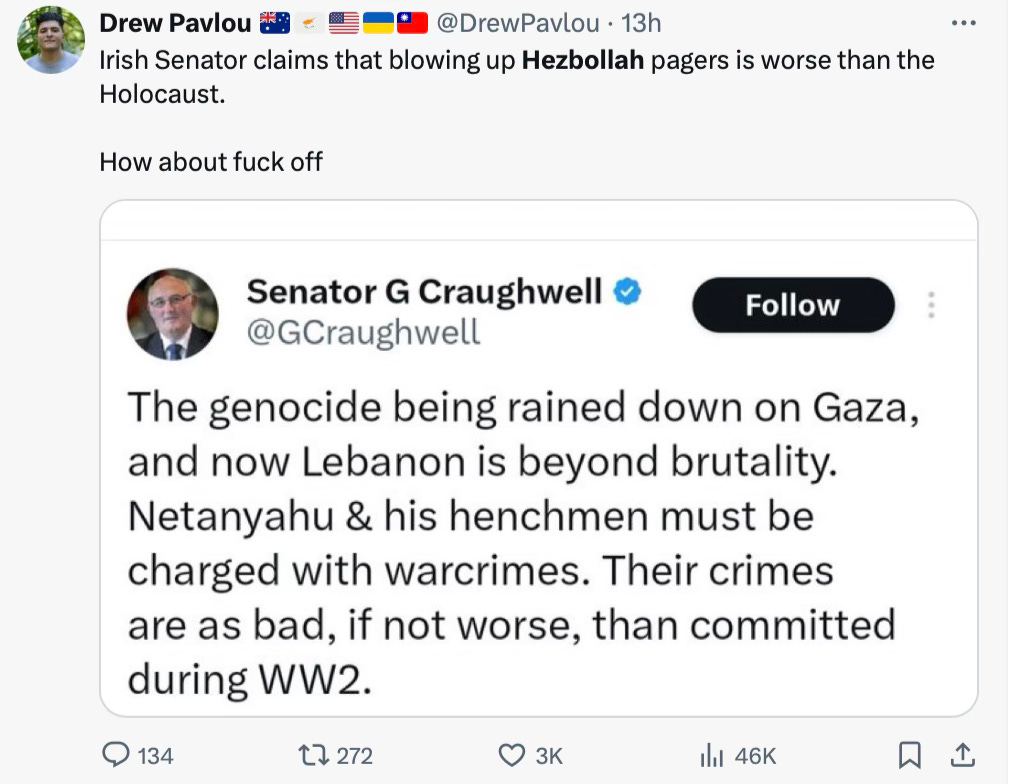I promised you’d get Global Eyes regularly, but I’m also desperately trying to finish the essay I’m working on. So today we’re just going to do a quick tour.
(The essay is making me nuts. I wish I’d never started it.)
Forty years ago today, a Hezbollah terrorist, directed and supported by Iran, sped his van laden with 3,000 pounds of explosives toward the new US embassy in East Beirut. The British ambassador’s bodyguard and Lebanese embassy guards shot the assailant, who lost control of the vehicle. It detonated at 11:44 am. The New York Times reported that the explosion “ripped off the front of the embassy, shredding glass, bending steel bars and destroying cars in a nearby parking lot.”1
Pandemonium ensued. Marines, clutching their M-16s, pulled on flak jackets. Diplomats, some with their clothes smeared with blood, staggered out of the wreckage holding walkie-talkies and looking for their colleagues. Two Americans were known to be among the dead. Most of those killed or wounded were believed to be Lebanese, either local employees or people seeking visas.
One of the dead Americans was Army Chief Warrant Officer Kenneth V. Welch, who was from Grand Rapids, Michigan. He was only 33 years old. You can read more about him here, and you should. It appalls me that our collective memory of this outrage has been wiped clean.
The other was Navy Petty Officer First Class Michael Ray Wagner, 30, from a town called Zebulon in North Carolina. You can read his father’s tribute to him here. He was buried in Arlington cemetery.
Hezbollah prepared for this attack at an IRCG training facility. The victims of the bombing and their families filed suit against Iran under the Foreign Sovereign Immunities Act, holding it responsible for its role in the attack and demanding compensation. From Wagner v. Islamic Republic of Iran:
… The testimony at trial was persuasive in establishing that over the past seventeen years since Michael Wagner’s death, the individual plaintiffs have each of them suffered intense mental anguish (or emotional distress) at the remembrance of the circumstances of Michael’s death and in the absence of his society and companionship ever since. Indeed, they will mourn him the rest of their respective lives. The evidence fully supports the conclusion that Michael Wagner was a central figure in the Wagner family—a beloved son and brother who enjoyed a deep and close relationship with each of his parents, his brother, and his sister. Moreover, it is significant that the terrorist act that resulted in Michael’s death was both unforeseen and horrific, a circumstance that renders grief all the more difficult to resolve. See Flatow, 999 F. Supp. at 30 (sense of loss more acute in case of death that was both sudden and violent).
The others who died were ordinary Lebanese citizens, mostly people who had come to the embassy to apply for a visa. I don’t know their names, but I’m sure they have been mourned every bit as deeply by their families. Twenty Americans and fifty Lebanese were wounded. I don’t know how severely.
The US had a new embassy in East Beirut because, 17 months before, Hezbollah had blown the old one, in West Beirut, to smithereens, in a bombing that claimed the lives of 63 innocents, including 17 Americans.
The mastermind of the bombing was Ibrahim Aqil, or Hajj Abdul Qader, to use his nom de guerre. Subsequently, he was involved in taking Germans and Americans hostage in Lebanon, and a bloody wave of bombings in Paris in 1986:
September 4: Failed attack on the RER at Gare de Lyon station;
September 8: Attack targeting the post office at Paris City Hall, one dead and 21 injured;
September 12: Attack on the Casino Cafeteria at La Défense, 54 injured;
September 14: Attack on the Renault Pub on the Champs-Elysées, three dead, one injured;
September 15: Attack targeting the Driver’sLicense Department of the Paris police headquarters, one dead and 56 injured
September 17: Tati store, rue de Rennes, seven dead and 55 injured.
For these crimes and others, Ibrahim Aqil was tried in absentia in France and sentenced to life imprisonment.
The US has long offered a reward for information about him. He’s been on our sanctions and specially-designated global terrorist lists for as long as I can remember. The Treasury Department knew he was playing “a vital role” in Hezbollah’s campaign in Syria. We also knew he had become a member of Hezbollah’s Jihad Council, its highest military body—the second-in-command after Fuad Shukr, then the first-in-command when Israel whacked Shukr, on July 30. He ran Hezbollah’s Radwan unit, which is Hezbollah’s “most formidable offensive force,” in the words of the AFP. The Radwan unit trains in cross-border infiltration. Israel has repeatedly demanded that Radwan be pushed away from its border.
Ibrahim Aqil was vaporized today in an Israeli airstrike.
Yesterday night saw the most intense Israeli airstrikes in south Lebanon since last October. This was, said Defense Minister Yoav Gallant, the beginning of “a new phase” in the war.
The strike that took out Aqil today, according to the IDF, took out a pair of multi-story buildings in Dahiyeh—Hezbollah’s south Beirut fiefdom. It also took out Hezbollah’s top commanders and the leadership of the Radwan Force, which was planning to invade the Galilee. All in one strike.
(Honestly—how did they not see that coming?)
The IDF also said they took out more than 100 Hezbollah rocket launchers “primed for immediate attacks on Israel.” And a Hezbollah weapons depot.
The Guardian is very sad. (But they made this nice graphic.)
The Guardian’s reporter hauled his ass out to a Lebanese hospital to check on the terrorists and see how they were getting on without their nuts:
… The pager and walkie-talkie explosions that ripped through Lebanon brought thousands of patients to hospitals in just a few hours. Doctors described apocalyptic scenes in emergency rooms, where overwhelmed staff had to treat patients on the floor due to lack of available beds. Many patients had lost hands and eyes. Most were reaching for their pagers or had brought them to their face when they exploded.
“This is to us is a new type of war where it is one specialty that is necessary: ophthalmology,” Rizk said. “In war cases, ophthalmologists are used 5 to 10 percent of the time; here it was over 90 percent.” He added that it was as if he was looking at “the same patient” over and over.
The resulting injuries would be long-lasting and require lifelong care, Rizk said. “No more fingers and no more eyes: this will be tough in the long term. It’s going to be a heavy burden on the society and these poor young guys.”
Poor young guys. With whole lives of killing people ahead of them, too.
Their reporter even spoke to the Lebanese health minister:
Firass Abiad, the Lebanese health minister, said: “The health sector in Lebanon has been tested and has always been found able to respond. The Lebanese health sector is really a resilient health system.” He said that despite the country’s five-year-long economic crisis, it has been able to cope with successive crises such as Covid19 and the 2020 Beirut port blast that wounded 7,000 and killed at least 218 people.
My father gets cross with me if I swear in this newsletter, so I won’t. I’ll just say: And whose fault was that explosion, Mr. Guardian? Did the port just spontaneously combust?
“Poor young guys,” my tuchas.
Volker Turk, the UN’s High Commissioner for Human Rights, primly denounced the pager attack. “International humanitarian law prohibits the use of booby-trap devices in the form of apparently harmless portable objects,” he told the Security Council. “It is a war crime to commit violence intended to spread terror among civilians.”
Intended to spread terror among civilians?
Iran, meanwhile condemned the strike that killed Ibrahim Aqil: “The brutal and vicious airstrike of the Zionist regime on Beirut … is a gross violation of international law and regulations, as well as the violation of Lebanon’s sovereignty, territorial integrity and national security,” said Iran’s foreign ministry spokesman.
Lebanon’s sovereignty? International law? …You?
What Drew said.
So remember, in all of this, that Hezbollah is Iran’s second-strike force. That’s their raison-d’être. Iran’s been nourishing this viper, for decades, to prevent Israel from taking out their nuclear program.
But Tehran can’t ignore this. Israel’s hit their guest house, their pet Hamasnik (on their own soil), their Hezbollahis, their consulate in Syria, their favorite ICRG goons, and now their ambassador. So they’re now in quite the bind. Do they want to give Israel the excuse they’ve been looking for? Now? With their precious second strike force all but decimated?
The head of the IRGC is making a lot of big promises: “Soon we will witness the complete destruction of this cruel and criminal regime with the crushing response of the resistance front,” he promised Nasrallah, according to Iranian state media.
But they have to be worried this will cost them their nuclear program, right?
I’m allowing myself to be hysterically hopeful, just for a moment. What if Israel was able to take out their nuclear program—and decapitate their miserable regime—by itself? With Hezbollah in ruins, the only thing stopping them would be their physical ability to do it. (It’s not their air defenses, as Israel also recently demonstrated.)
I don’t know if it’s possible, militarily. Everyone gives me a different answer to this question. If we were in our right minds, we’d help with everything we’ve got, but we’re not. But maybe they could do it? Without getting obliterated by Hezbollah?
Man, would that make the world a better place.
Device detonations reveal “incredible” intelligence abilities: ex-NSA chief. “I think about our own supply chains and what we need to be able to do to ensure their integrity,” Paul Nakasone said:
The perpetrators “had incredible ability to do targeting intelligence and to be able to actually know the numbers, know who’s got them, [and] know the periodicity upon which they’re using them,” said Paul Nakasone, the former director of the National Security Agency and four-star commander of US Cyber Command.
Yes, we really should think about this. Owen’s comment yesterday was apt:
Speaking of which …
The weaponization of everything has begun. Israel’s turning of everyday communication and information tools into deadly weapons births new era of paranoia and fear:
… In 1999, two colonels in the Chinese military wrote a book on the changing character of war and international politics in an age of digital technologies. … One of the most troubling comments in their book is on the potential weaponization of everything in future global conflicts: “[These] new concept weapons will cause ordinary people and military men alike to be greatly astonished at the fact that commonplace things can also become weapons with which to engage in war.
Concerns mount over supply chain attacks on US seaports:
As the United States looks to shore up the cyber-resilience of its critical infrastructure, a congressional report has highlighted that the nation's maritime shipping and port operations rely too much on Chinese-made cranes and other systems whose software is often vulnerable and can be communicated with remotely.
Last week, the House of Representatives' Select Committee on the Chinese Communist Party released a report on the potential threats to the US port infrastructure, revealing that 80 percent of the ship-to-shorecranes at US ports are manufactured by a single Chinese government-owned company, Shanghai Zhenhua Heavy Industries. While the committee did not turn up evidence that the company used its access maliciously, the firm failed to address software vulnerabilities and retained the ability to remotely access the crane’s systems via a cellular modem, often without explicit notification.
China-Philippines retreat, for now, from Sabina Shoal row:
The Philippines and China have effectively ended a recent standoff over the Sabina Shoal in the South China Sea, marking at least a temporary de-escalation in maritime tensions many fear could tilt toward armed conflict.
The National Maritime Council, the newly established interagency task force overseeing the Philippines’ South China Sea policy, announced on September 15 that the Philippine Coast Guard flagship BRP Teresa Magbanua was leaving the shoal area after a grueling five-month-long mission. Shortly after, China reportedly also withdrew its armada of coast guard and militia forces from the contested land feature’s area in the Spratly group of islands.
According to Philippine officials, China had parked more than 200 vessels—a combined force composed of Chinese Coast Guard and Chinese maritime militia—in the Spratlys, with as many as 71 deployed close to the Sabina Shoal. Critics of the Philippine government were quick to characterize the vessel’s withdrawal as a de facto “surrender” while opining how China had supposedly “outsmarted” the Ferdinand Marcos Jr. administration through its pressure tactics.
The critics are correct, but it doesn’t sound as if China outsmarted Marcos, precisely. They just bullied him. It would have been nice if we’d parked a few hundred vessels in the Spratleys, too, just to say “Hi.”
Apparently, we offered. According to the Philippines’ Army Chief of Staff, they turned us down, telling us they prefer to conduct unilateral operations in the region:
Brawner … claimed that the Philippines would only resort to bilateral operations with US forces if there were no other options left. “When our troops are already hungry, they don’t have any supplies anymore because our resupply mission have been blocked and they are on the verge of dying, then that’s the time we are going to seek the help of the United States,” Brawner said.
I don’t understand Philippine culture well enough to get how this makes sense. Did anyone suggest to him that maybe if you nip this sort of thing in the bud it won’t ever get to that stage?
Russian soldiers charged with killing US man who fought for Moscow in eastern Ukraine:
Four Russian soldiers have been arrested and charged with torturing and murdering Russell Bentley, a US citizen who had fought alongside pro-Kremlin rebels in eastern Ukraine, Russian investigators said Friday. Bentley, a 64-year-old self-described communist from Dallas, Texas, joined pro-Russia separatists in 2014 to fight against Ukrainian forces. He went missing in the Russian-occupied city of Donetsk in April and was later found dead.
According to investigators, three of the men tortured Bentley on April 8, leading to his death. Vansyatsky and Agaltsev then allegedly blew up a car with Bentley’s body inside and ordered Bazhin to conceal the remains. The men face charges including abuse of power resulting in death, as well as desecration and concealment of a body. The motive behind Bentley’s murder has not been disclosed, but his allies have speculated that he may have been mistaken for a spy. Bentley’s wife, Lyudmila, previously claimed that Russian soldiers from a tank battalion abducted him.
Bentley, nicknamed “Texas” by his fellow servicemen, fought for the Donetsk-based Vostok battalion between 2014 and 2017 and became a Russian citizen in 2021.
I guess that speaks for itself.
Igor Gorgan, the former chief of staff of the Moldovan military, has been charged with treason. The Prosecutor’s Office for Combating Organized Crime and Special Cases said that Gorgan stands “accused in the case concerning alleged espionage on behalf of Russia.”
French Prime Minister Michel Barnier has reached a deal with centrist and conservative lawmakers to form a new government. I’d forgotten we didn’t have one; things have been fine without it.
Defeat at the hands of the far right this weekend will almost certainly spell the end for the German chancellor:
Scholz could very well share the fate of US President Joe Biden—thrust aside by his panicking party to make way for a candidate who can avoid a massacre in a national election next year. Scholz’s center-left Social Democratic Party narrowly trails the far-right Alternative for Germany in polling ahead of Sunday’s election in Brandenburg, the eastern state surrounding Berlin. If the SPD loses this traditional bastion, it will be the latest in a litany of electoral failures. The party was beaten into third place—behind the AfD—in the June European election, a stinging loss that has only been compounded by two major reversals at the ballot box in eastern Germany. On September 1, the far right notched its biggest success since World War II, winning the state of Thuringia and finishing a close second in Saxony. Scholz’s SPD was crushed in both votes.
Another drubbing by the far right will only accelerate the SPD’s calculus on when to pull the ripcord. What that entails is still unclear: It could mean a snap election, or maneuvering the more popular Defense Minister Boris Pistorius into the prime electoral slot for a national vote in 2025.
US and Syrian Democratic Forces launched a raid in Syria that killed four ISIS operatives.
Cartel violence surges in Sinaloa after leaders arrested. AMLO blames the US:
Mexican President Andrés Manuel López Obrador blamed the United States … for the surge in cartel violence terrorizing the northern state of Sinaloa which has left at least 30 people dead in the past week. Two warring factions of the Sinaloa cartel have clashed in the state capital of Culiacan in what appears to be a fight for power since two of its leaders were arrested in the United States in late July. Teams of gunmen have shot at each other and the security forces. … Asked at his morning briefing if the US government was “jointly responsible” for this violence in Sinaloa, the president said, “Yes, of course ... for having carried out this operation.”
Iran’s persistent sadness. The country’s culture of bereavement may be producing a cycle of misery. (This is fascinating.)
The article reports that “a shadowy group known as Islamic Holy War” claimed responsibility for the bombing. This was Hezbollah’s cover name.














One useful bit of information has been vouchsafed to us by recent events: The absolute moral idiocy of the Western “anti-Zionist” Left is now on full display. What could be more nauseating than AOC’s weepy laments about Israel’s violation of “international humanitarian law” with its pager/radio strikes against the defenseless employees of Hezbollah? This happened to make he think of the opening segment of the movie “Patton.” George C. Scott’s bravura performance in that scene was not fictional. The original version of Patton’s address to his troops on the eve of D-Day can be read in the Library of America’s second volume of “American Speeches.” In a way, it meets the present moment. Here’s the film version:
https://m.youtube.com/watch?v=PS5yfhPGaWE
The pager bombing was brilliant - one of those things that reminds me why I admire the one US ally that's all-in on self-sufficiency and looking out for its own survival, come fair weather or foul.
The behaviour of the Philippines - well, that leaves a lot less room for optimism. The same with Japan, and Taiwan, and Korea - they've all neglected their militaries, became too dependent on US security guarantees (some formal, some informal, some purposefully ambigous) which may or may not be enough when push comes to shove (see: Ukraine).
That sort of uncerteinty makes the world dangerous. It's a theme I've written about on my own substack: https://twilightpatriot.substack.com/p/the-poland-paradox